‘Korean clinic’, a combination of traditional healing methods
By Ranil WIJAYAPALA
|
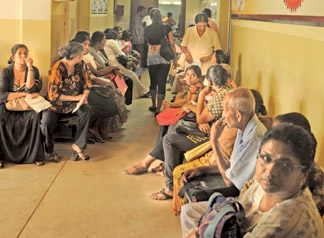
Queue of patients waiting for treatment
|
With the ever growing demand for health facilities in Sri Lanka it is
natural to see long queues of patients at any hospital whether it is
government or private. And for many of those who seek indigenous and
traditional medicine for their illnesses and physical disorders, the
National Teaching Hospital of Ayurveda has become a major attraction.
However, for people who visit the National Ayurveda Hospital in
Borella, the long queue of patients at the Korean clinic may not be
surprising. The Korean clinic has become popular among patients visiting
the National Ayurveda hospital due to its reputation among the public.
But one may wonder why people are attending this Korean clinic
instead of a large number of other clinics available at the Ayurveda
hospital.
Therefore, it is worthwhile to find out what is so special at this
Korean clinic for it to become popular.
If someone goes inside this neatly and cleanly maintained small
clinic, he or she may find that it is not only a place where Korean
oriental medicine is practised but a place where Korean oriental
medicine and indigenous and ayurvedic medicine is harmoniously practised
to treat patients while enriching the two disciplines of medicine
mutually.
Though the clinic is known as the Korean clinic it is mostly Sri
Lankan Ayurveda doctors who are there to treat patients as it has become
place of transferring knowledge of Korean oriental medicine and
acupuncture treatment methods to Sri Lankan Ayurveda physicians.
Dr. Han Gyu-eon, who is in charge of the Korean clinic which was
donated to the National Ayurveda Hospital in 2003 by the Korean
Government through the Korea International Cooperation Agency, said that
half of Korean oriental and acupuncture treatment methods and Sri Lankan
Ayurveda treatment methods are similar while there are slight
differences in the other half.
|
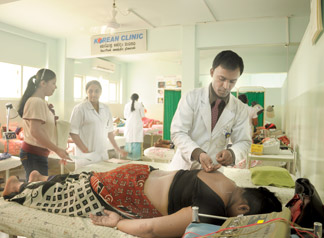
Acupuncture treatment for patients |
“The constitutional medicine which is also known as Sa sang medicine
which identifies the physiological characteristics of an individual
before treatment is a special characteristic of Korean oriental
medicine,” he said.
“Western medicine does not think about constitution. But under Sri
Lankan Ayurveda medicine and Korean medicine, patients are categorised
constitutionally at the time of diagnosis. Acupuncture treatment is done
according to the patients constitution,” he said.
According to constitutional medicine, people are categorised into
four groups, Greater Yang, Greater Yin, Lesser Yang and Lesser Yin in
consideration of respiratory function, liver or heart function and
gastrointestinal function. This is based on the body type of the person.
According Dr. Gyu-eon though western medicine is well developed it has
its limitations. Western medicine has limitations in treating brain and
spinal cord damage and muscular and nerve system damage and they face
cancer and pain control difficulties.
“Through our traditional oriental medicine practices we can treat
brain cell damage and spinal cord damage and spinal cord system damage
can be controlled through acupuncture treatment,” he said.
“There is no hundred percent perfect medicine for treating patients.
Each medicine has is merits and demerits. Therefore with a combination
of Sri Lankan Ayurvedic medicine and Korean oriental medicine we can
have synergy effects,” he said. He said that in future traditional
medicine in Asia and Western medicine can combine together and that will
be the future medicine in the world.
“We need to discuss it and combine all the medicine systems together
to create accurate and the best treatment for patients. That is good for
the doctors and also for the patients and that will be the best method
of treatment. Step-by-step we started combining the Ayurveda system and
the Korean oriental medicine system. Now this combined system is
practiced at this Korean clinic at the Ayurveda hospital,” he said.
This Korean clinic functions as a centre to transfer Korean
acupuncture treatment methods to Sri Lankan Ayurvedic practitioners and
those who are studying Indigenous Medicine at the Institute of
Indigenous Medicine in Rajagiriya.
From 2004, six batches of Sri Lankan Ayurvedic doctors were trained
in Korean acupuncture medicine and altogether 133 doctors have been
trained under this program.
“They all are now working in different parts of Sri Lanka from the
North to the South and the East to the West. They are not only trained
in acupuncture treatment but also about patient treatment applications
which is one of the most important parts in Korean oriental medicine,”
Dr. Gyu-eon said.
At the initial stages in 2003 and 2004 Dr. Gyu-eon treated all the
patients at the clinic but after 2009 the treatment of 50 percent of
patients was undertaken by Ayurvedic doctors.
“Now my aim is to train Ayurvedic doctors to take over this clinic
through a step-by-step process. That is my goal. Apart from that we
expect to expand our treatment methods to other parts of the country in
the future,” he said. Every year, one or two Sri Lankan doctors visit
Korea to participate in training programs and sometimes Korean doctors
visit Sri Lanka. “By this method both countries are transferring the
traditional oriental medicine systems between the two countries and
developing it,” he said.
Dr. Wijedasa Wanniarachchi, a Sri Lankan Ayurvedic doctor an expert
in the Korean oriental medicine and acupuncture treatment, who acts as
the coordinator of the Korean clinic said that acupuncture treatment is
not a novel thing in Sri Lanka and there is enough evidence to prove
that it has existed in Sri Lanka from ancient times.
“Sri Lanka inherits a rich history of the indigenous medicine system
from the era of King Ravana and the acupuncture medicinal system which
originated in China and Korea has existed here in Sri Lanka parallel to
those developments,” he said.
|
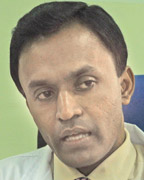
Dr. Wijedasa
Wanniarachchi |
|
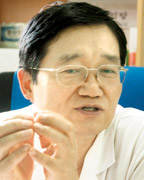
Dr. Han Gyu-eon |
Countries like China and Korea use acupuncture treatment as their
main medicinal system but in Sri Lanka and India acupuncture treatment
is not popular. “That is because India and Sri Lanka have enough herbal
medicines for treating patients.
But in Korea and China they don’t get enough herbs. That is why they
have adopted acupuncture treatment,” he said. According to Dr.
Wanniarachchi in Ashtanga Ayurveda,(Shalya thantraya (Surgery), Shakalya
(ENT with Opthalmology), Kaya Chikitsa (Medicine/ Therapeutics), Bhoota
(Psychiatry), Kaumara (Gynecology Obstetrics and Pediatrics) Agada
(Medical Jurisprudence and Toxicology, Rasayana (Gerontology),
Vajikarana (Science of Aphrodisiac)) these methods have been practised
for different ailments. As a doctor trained in the Korean medicinal
system in Korea, Dr. Wanniarachchi said that they are practising the
Korean oriental medicine as a combination of oriental medicine and
western medicine in the same hospital under the same university.
“There is a connection between traditional Chinese Medicine and
traditional Korean Medicine. But today the traditional Korean Medicine
has been developed to a good medicinal system based on the theories and
the techniques unique to Korea. They are accepted across the world and
it is being discussed worldwide now”, he said.
According to Dr. Wanniarachchi traditional Korean medicine has been
popular in Sri Lanka since 2003 as they conduct this Korean acupuncture
treatment clinic making use of the traditional medicinal system which
was in use in Sri Lanka in the ancient times combining with improved
traditional Korean oriental medicine systems. “The Korean Government
donated this clinic through the Korean International Cooperation Agency.
They have given this Professor and maintaining this clinic and have
trained 50 Ayurvedic doctors. In addition to that the third year and
fourth year students of the Indigenous Medicine Institute are also being
taught Korean medicine at this Korean clinic,” he said. “We are
conducting this clinic five days of the week in the mornings. In the
evening we provide treatment only for a few patients and we clean the
clinic in the afternoon. We have to keep this place clean because we
treat patients by puncturing them and removing blood.
Therefore, we have to keep this place clean for the treatment of
patients. We are bound to do that on behalf of the patients. That is why
we are confining our activities only to morning hours,” he said.
The clinic treats 150 to 160 patients on a daily basis.
“On Tuesdays and Thursdays we have allocated the clinic for obesity
patients while allocating the other three days for the treatment of all
other patients”, he said.
The clinic treats muscular vascular disease, disc collapse, shoulder
pains, neck pain, lower back pain, osteolysis, multiple back pains, knee
pains and knee joint pains.
At the same time the clinic also caters to diabetic patients, people
suffering from headaches, sinusitis, arthritis, obesity, urinary
problems, gynecological problems such as irregular menses, painful
menses, fibroids, sub fertility, skin diseases and also for treatment
for post surgery disorders such as after surgery numbness. “We have four
Ayurvedic doctors trained in Korean acupuncture treatment, two labourers
to serve at the clinic and we have 30 beds in the clinic.
In addition we have laboratory services for blood and cholesterol
tests,” Dr. Wanniarachchi said.
“The patients coming here are very fond of this clinic. More than 80
percent of the patients coming here do not need any treatment either
internal or external. The people who have internal problems are also
suffering mentally. Therefore, we have to treat the patient mentally
also. We discuss the history of the patient before diagnosing. We
maintain a close relationship with them,” he said.
“We ensure that needles used for acupuncture treatment here are
sterilised, disposable ones and they are directly imported from Korea
and used only once,” Dr. Wanniarachchi said.
“With the limited space available at the clinic we cannot cater to a
large number of patients. But we are ready to expand this service to
other parts of the country through our Ayurvedic doctors for the benefit
of those who seeks our services,” Dr. Wanniarachchi said.
[‘We can learn from Korean oriental medicine’]
|
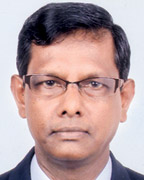
Prof. Gunapala Amarasinghe
|
As a part of continued cooperation for the advancement of the
oriental medicine practised in Korea and Sri Lanka, Professor Gunapala
Amarasinghe of the Institute of Indigenous Medicine of the University of
Colombo, who recently visited the Oriental Medicine Hospital, Kyung Hee
University, Seoul, Korea and the Korea Institute of Oriental Medicine,
Daejjeon, Korea has been offered membership of the Association of Sasang
Constitutional Medicine of Republic of Korea and membership of the
Association of Pediatrics in the Academy of Korean Oriental Medicine.
Professor Gunapala Amarasinghe during his visit delivered lectures to
postgraduate students at the Oriental Medicine Hospital and participated
at the annual sessions of Association of Oriental Pediactrics at the
Academy of Korean Oriental Medicine. Professor Gunapala Amarasinghe is
the only Professor in Ayurvedic medicine in Sri Lanka who specialises in
pediatrics.
Prof. Amarasinghe said that Sri Lanka and Korea can go long way in
developing oriental medicine practised in the two countries by learning
from each other. At the same time Sri Lankan Ayurvedic physicians and
students can learn many things from Korean oriental medicine developed
with advanced technology combining with other medicines practised across
the globe. “The Korean clinic at the National Ayurveda Teaching Hospital
will open its doors for Sri Lankan students to absorb that knowledge,”
he said.
|


